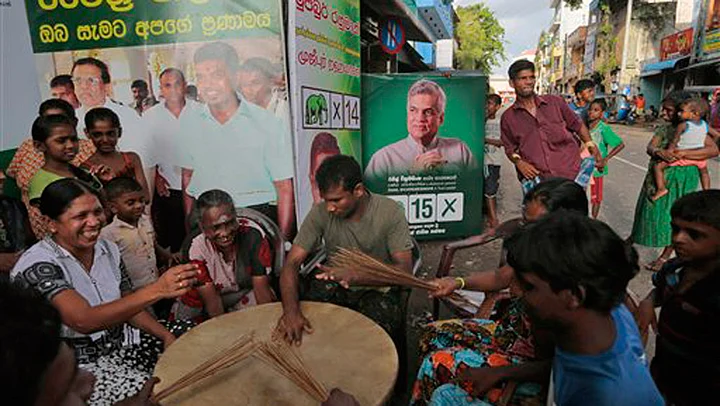Time to Renew Ties with Lanka
- After the election results, those opposed to Rajapaksa are delighted that the “gains of January 9 elections’’ have now been consolidated
- Ranil Wickeremesinghe has maintained cordial relations with New Delhi all through his political career
- New Delhi should move in quickly to ensure that the pro-China tilt in Sri Lanka’s foreign policy does not recur
- What is certain is that the new government in Colombo will keep India’s strategic interests in mind
- For India the other important issue will be granting the Tamil minorities a degree of self-rule
Sri Lanka’s parliamentary elections have once again emphatically stopped former strongman Mahinda Rajapaksa’s bid to return to power, this time as prime minister. The opposition United National Party for good governance trounced him once again. Rajapaksa had to face the ignominy of being rejected, first in January by Maithripala Sirisena, his own partyman who was the candidate for a combined opposition, and this time around by Ranil Wickremesinghe.
Though the UNP will fall short of an outright majority, Wickremesinghe will be able to easily stitch together a government. Those opposed to Rajapaksa are delighted that the “gains of January 9 elections’’ have now been consolidated. “Let us together build a civilised society, build a consensual government and create a new country,” Wickremesinghe said in a statement after the results.
India will welcome the results as Wickremesinghe has been a long-time friend. Even during the India-Sri Lanka accord of 1987, when many senior members of the J R Jayawardene government were against asking the Indian army into the north and east of the island, Wickeremesinghe supported the move. He has maintained cordial relations with New Delhi all through his political career.
Regaining Space in Lanka
It is up to India now to make up on lost ground and regain some of the space lost to China. New Delhi should move in quickly to ensure that its footprints remain intact in the island nation and the pro-China tilt in foreign policy under Rajapaksa does not recur.
Though India gave unstinted support to Rajapaksa
during his military campaign against the LTTE, his adamant refusal to honour
his promise of devolution to the Tamil minorities and wooing China made relations
rocky. When New Delhi backed the March 2012 US resolution against Colombo at
the UN Human Rights Council in Geneva, Rajapaksa was outraged and began
cultivating China in a big way. Earlier, he was mindful of India’s
strategic interests and drew a red line, but since India’s UN vote he opened
the island up for China.
The Chinese, with little care either about human
rights or domestic policy, poured billions of dollars into projects in Sri
Lanka. This also gave China a foothold on an important Indian Ocean
nation. Alarm bells rang in New Delhi when a Chinese naval submarine
docked, not once but twice, in Colombo. In neighbouring Maldives too China’s presence
is all pervading. The latest move by President Abdulla Yameen to allow outright
purchase of atolls by foreign governments provided they invest a billion
dollars in the island nation, has strengthened China’s hands.
Curtailing China’s Influence
China’s presence in Gwadar port in Pakistan, building a container depot in Chittagong in Bangladesh, its presence in Myanmar and stretching itself across the Maldives, has India worried. China says it is engaged in ensuring smooth running of trade routes, as it imports raw material, including oil (largest consumer in the world), to keep its growth engines chugging. India is glad that at least in Sri Lanka, with Rajapaksa’s exit, China’s influence will reduce.
It was not just India that warily watched
China’s footprints expand in Sri Lanka. The US, Australia and the Europeans,
already uneasy about China’s growing military clout and its assertiveness
in the South China Sea, were anxious too. After Rajapaksa’s defeat in the
presidential elections in January this year, both India and the US were
delighted. President Sirisena kept the faith by flying to Delhi in his first
foreign visit since taking office.
Sirisena and Wickremesinghe put many of China’s
major projects on hold on the ground that they flouted land and environmental
laws as well as suspicion that money had been paid. The $1.5 billion Colombo
Port City which the Chinese were building from reclaimed land is one of
the largest Chinese projects. Reviews are already underway. Possibly the port
city project will continue, but what is certain is that the new government in
Colombo will keep India’s strategic interests in mind. The 1987 India-Sri Lanka
accord lays down that the two countries will not allow each other’s territory
to be used against the other.
The Tamil Question
But this will not mean that Colombo will shut its doors to China. Everybody is looking for Chinese investments. India too wants Chinese funds for its massive infrastructure projects. But Sirisena and Wickremesinghe will not follow a pro-China foreign policy. They will be open to all countries, especially India.
For New Delhi the other important issue will be granting the Tamil minorities a degree of self-rule within the unitary framework of Sri Lanka’s constitution. India is looking forward to a solution to the ethnic issue.
(The writer is a Delhi-based senior journalist)
